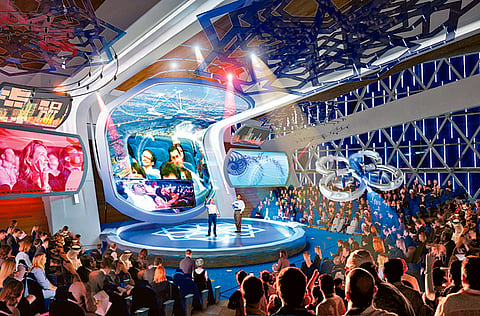Expo 2020 to start taking shape early next year
All major construction set to be completed by October 2019

Dubai: Construction of the infrastructure for the World Expo 2020, which Dubai won the bid to host in November, is expected to start early next year, according to a statement on Monday by the Dubai World Trade Centre (DWTC), the developer of the Expo2020 site.
The six-month event will be held at Dubai Trade Centre-Jebel Ali, a site equidistant from the centres of Dubai and Abu Dhabi, and adjacent to the Dubai World Central airport and Jebel Ali Port. The World Expo, which is held every five years, showcases exhibitions, pavilions and cultural events.
Work on the site will kick off following an approval of the Registration Dossier by the Bureau of International Expositions (BIE), the governing body of the World Expo.
The dossier includes elements in the Bid Document, such as the master plan, theme and communications programmes.
All major on-site construction is set to be completed by October 2019. Infrastructure and operational costs are estimated to be €6.45 billion.
Master plan
The 438-hectare site will include a gated Expo area, covering 150 hectares, and will be surrounded by a residential, hospitality and logistics zone.
The master plan will project the theme ‘Connecting Minds, Creating the Future.’
The gated area will have three zones for the mobility, sustainability and opportunity Expo2020 sub-themes, which will meet at the central Al Wasl Plaza. There will be three souks, one in each zone.
Each thematic zone will have one feature Entertainment Venue and a specialised Theme Pavilion.
The Al Wasl Plaza will be surrounded by the UAE Pavilion, Welcome Pavilion and Innovation Pavilion.
In addition, housing facilities for staff from the participating countries working on Expo2020 will be offered at the Expo Village, which is likely to be completed by 2018. Construction of the pavilions is expected to follow soon after.
“The sheer level of detail that has already been developed for the Master Plan means that we are significantly advanced with the requirements for the immediate next stage of delivery and well on-track to ensuring timely and holistic implementation,” said Helal Saeed Al Merri, CEO of DWTC and Director-General of the Dubai Department of Tourism and Commerce Marketing (DTCM), in a statement.
Transportation for visitors
With the large number of visitors expected at Expo 2020, transportation systems to and from the exhibition will be developed.
An extension to the Dubai Metro (Red Line) will be built, along with a station at the exhibition site.
Also, there will be a bus service to transport visitors to and from the exhibition from different pick-up points across the UAE.
The Al Wasl Plaza will be within 15 minutes’ walk from any part of the site.
The exhibition site can accommodate up to 300,000 visitors at its peak and 153,000 visitors on average on a week-day.
Expo 2020, which will run from October 20, 2020, to April 10, 2021, is expected to attract 25 million visitors and 250 participants.
“Building and implementing strategic partnerships on a city-wide level is already being progressed and the driving forward of potential international participant engagement across governments, private sector and institutional players is underway,” said Reem Al Hashemi, the UAE’s Minister of State and a member of the Expo Preparatory Committee.
In order to be sustainable, Expo 2020 aims to supply at least 50 per cent of the exhibition site’s energy needs with energy from renewable sources. The event also expects to reduce water consumption by 25 per cent across the pavilions and buildings on-site.
Sign up for the Daily Briefing
Get the latest news and updates straight to your inbox



